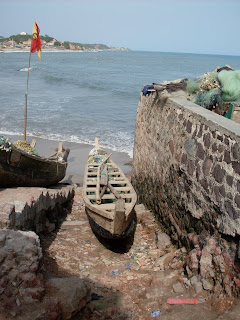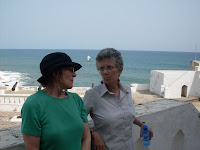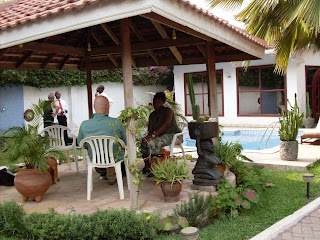The team decided that the new project, The Roamer Initiative, will focus on roamers, ie mobile sex workers, since they’re so much more difficult to find than their seater counterparts and, even when contacted, less open to influence. And their HIV rates are rising while seater rates are falling.
We held a brainstorming session on Wednesday with the APP staff, about 10 Peer Educators, and 2 Social Officers. Many fine ideas came out of that meeting, and we started writing them up as material APP can use in the proposal. We were even able to write one of the actual proposal sections.
One interesting fringe benefit: the PEs – who are all current or former sex workers – really liked being considered experts with ideas to share and it was great to see them mixing it up with their bosses.
 Then, also on Wednesday, APP hosted a lunch with all the other AJWS volunteers and their NGO counterparts. Since everyone is working directly or indirectly in the field of AIDS prevention/treatment, it seemed a fine opportunity for networking. And so it was: 14 of us at the Wednesday buffet at the restaurant at the National Museum. Grilled tilapia, banku, Red-Red, goat stew, palava (spinach) sauce, and lots more.
Then, also on Wednesday, APP hosted a lunch with all the other AJWS volunteers and their NGO counterparts. Since everyone is working directly or indirectly in the field of AIDS prevention/treatment, it seemed a fine opportunity for networking. And so it was: 14 of us at the Wednesday buffet at the restaurant at the National Museum. Grilled tilapia, banku, Red-Red, goat stew, palava (spinach) sauce, and lots more.Thursday, Geoffrey and the Executive Director had a meeting with the Director of the Peace Corps in Ghana, to discuss possible opportunities for PC Volunteers, and there are a few. (Just one example: APP would like to offer skills training to sex workers who’d like to do something else but have no skills. One possibility is a volunteer to help with a center which will teach them to sew high-quality goods, then form a coop to market those goods.)
Then, in the afternoon, the APP team had a meeting to discuss/brainstorm possible solutions to the “condom problem” – they’re sometimes unavailable or prohibitively expensive. (APP distributes about 5 million annually – and that figure will more than double if the Strategic Plan is realized!)
(To understand how terrible this problem is, consider that APP, through its Peer Educators, has convinced thousands of sex workers – more than 25,000 in total – that they’re better off if they insist their clients use condoms. Now that the sex workers are convinced, it’s critical that they have access to a steady supply. As one seater sex worker said during our visit, “Without condoms, I die.”)
And it looks like the brainstorming may have worked! We came up with an interesting way of seeing the problem and the players, which led to a possible new approach and the Executive Director has already started making calls and setting up meetings to make it happen. That felt pretty exciting!
Friday we put all the pieces of the Strategic Plan together, made our emotional farewells, and were surprised with some very nice Ghanaian clothing as gifts.
 Now that it’s over, we feel quite good about what we were able to accomplish. We believe APP is perched for growth: reducing the incidence of HIV/AIDS by doing what it does well in more locations with more Peer Educators and sex workers, plus offering some new services as well.
Now that it’s over, we feel quite good about what we were able to accomplish. We believe APP is perched for growth: reducing the incidence of HIV/AIDS by doing what it does well in more locations with more Peer Educators and sex workers, plus offering some new services as well.Saturday was our last day and to help us solve the what-to-do-until-the-late-night-flight problem, our friends, the other AJWS volunteers came over “to Paradise” for a poolside barbecue – a very nice way to bring our 7 weeks to a close.
To speak more broadly, our impressions of Ghana have evolved during our time here.
When we first arrived, we fell into the trap of comparing Accra with the other West African city we know well – Dakar. We were unsettled by the city’s not being laid out particularly aesthetically, by the less interesting food, by the much hotter climate and yaddayaddayadda.
But we changed.
We’ve come to admire the Ghanaians enormously: their friendliness and, simultaneously, their competence and modernity. Granted, we still think Kumasi is aesthetically more pleasing than Accra, but so what. We’re so impressed with the vigor and openness of the press here, with a variety of newspapers, and the free discussion of political issues. And tolerance and respect – black/white, Christian/Moslem, Ashanti/Ewe/Ga/etc – are deeply stitched into the day-to-day consciousness.
 One of the amazing and admirable things about Ghana is the rampant spirit of free enterprise. You see it in the markets and in the thousands of small – really small, often only about 8 feet by 4 feet – stores that are everywhere and sell just about everything and are open just about all the time. This is one of many on our block.
One of the amazing and admirable things about Ghana is the rampant spirit of free enterprise. You see it in the markets and in the thousands of small – really small, often only about 8 feet by 4 feet – stores that are everywhere and sell just about everything and are open just about all the time. This is one of many on our block.We loved our neighborhood, its authenticity as an African neighborhood that’s on its way up, even if it’s not there yet. And we came to love the lilt of the Ghanaian accent as they emphasized different words than we would. We even started saying “sistah” (sister), “Jokah’s (Joker’s Pub),” and the clearly enunciated “You are welcome” which somehow seems so much less perfunctory than “you’re welcome.”
 And, one mo' time, we love the kids on our street going off to school in the morning, but this time we got a picture of them.
And, one mo' time, we love the kids on our street going off to school in the morning, but this time we got a picture of them.We’re grateful we got the opportunity to meet sex workers, a group we’d never interacted with before – in the U.S. or anywhere else. We came to appreciate them and their difficulties, and applaud the success and growing self-esteem of those who became Peer Educators.

We’ll never ever forget Bob and his amazing sand sculptures. (This one was a little racier than his others, presumably because it was created for Valentine's Day.)
All in all, it was an enriching seven weeks with lots of new experiences, new friends, and new memories.
And now here we are, ready for the next chapter. (But no more postings on the Ghana 2009 blog. Bye-bye.)







































